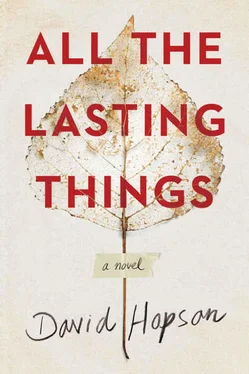“He is. But not with a cold.”
Cat extended her hand to the rest of the family, explaining who she was as if they already might know. Benji breathed in the scent she brought with her, that shampoo smell he’d been so sure he’d never smell again, with an exhilarating sense of confusion. Why in the world was she here? He expected visits from Jerry and stoner Bill and maybe even Kay, whose overly ornate get-well bouquet practically reeked of schadenfreude, but never Cat. Her appearance was a puzzle, one that couldn’t be solved — not by him, not now — but one he would enjoy piecing together in his happy haze of Percocet.
She gave him a beautiful used copy of To the Lighthouse wrapped in newsprint and dove with Henry, whose clarity returned to him as quickly as it departed, into an animated discussion of its merits. Benji fumbled through the opening pages while Cat spoke with his father. Henry’s reading lists, which as a teen Benji tended to find joyless and demanding, had largely turned him off serious novels, but he rallied unexpectedly to these opening pages. How bad could a book be when a young boy sits ready to stab his father through the heart with a pair of scissors? But after five minutes the day nurse wandered in with her blood pressure cuff and broke up the fun. Cat, ready, it seemed, for a hasty retreat, kissed him again — a softer, more lingering kiss — or did he imagine it? He set the book down and scrambled for his pad. Come back! he wrote.
She laughed as if the idea hadn’t occurred to her. “If I can.”
Wait. I won’t be here. They’re discharging me.
“That’s good news.”
I’ll be with my parents for a while. U can read to me .
“Read to you,” Claudia said, incredulous. She leaned in close to his ear, whispered, “We’re not done with the Treadwell conversation,” and, before he could protest, offered to walk out with Cat.
Benji shot her a Medusa’s stare but grabbed Cat’s hand and persevered. “Pwomise?”
“Okay,” she said with a rising blush, “I promise.”
When Cat and Claudia had left, Evelyn finished beheading the last few dying flowers before taking her spot on Benji’s bed. She placed a hand lightly on his arm and said, “Your sister loves to stir things up.”
Still savoring the delicious smoke of Cat’s promise, Benji didn’t breathe. He held his breath, as if compounding his high. He hardly noticed Henry get up from his chair, but then he felt the weight on him, extraordinary and rare. His father stood over the bed like a priest, eyes closed, head bent, one hand pressed to his son’s forehead as if to bless him. “No fever, Ev. You check.”
Evelyn shooed Henry’s hand out of the way and went through the motions of taking Benji’s temperature with supreme indulgence. “No fever,” she said, then, having ushered Henry back to his seat, turned to Benji. “What were you saying? Before your friend—” Evelyn paused at the word, turning it over like a teacup in a china shop, curious to know the price. “Before your friend came in?” She picked up his pad and turned back the page to where he’d written DIDN’T .
“You didn’t what?” She wagged a finger at him as if to say he couldn’t get away with anything, not on her watch. “See?” she said confidentially, taking his hand. “Some of us still remember around here.”
Held by his mother, watched by his father in an attitude of strange and attendant warmth, Benji took a head-clearing breath and shook his head. His fingers fluttered at his temples to show that the thought, whatever it was, had flown away, before picking up his pen. I forget.
Evelyn is afraid. It’s her first time, though no one can know it’s her first time. This is important to her. The neighbors are one thing, there’s no getting around what they’ve seen, but the doctors, the nurses: it’s none of their business, she says. She has to pray the neighbors will keep their mouths shut. And remarkably they do. Forty years later, somehow, miraculously, Claudia does not know. But at this moment, Claudia is barely four. She is in my arms. She wears a green gingham dress and wants to climb onto the gurney with her. I stoop to where she can reach and say, Give Mama a kiss. Claudia fidgets and cries; she doesn’t want her mama to go. Evelyn puts her hand in mine. I give it a squeeze before they wheel her off. It’s morning. By the time they come back, it’s night. She’s in the recovery room, they tell me, asleep. We go to the nursery. Claudia passes out on my shoulder on the elevator ride up. There are other fathers at the window, men in loosened ties with their hands pressed against the glass, staring. The nurse waves to me in her starched whites, then wheels a glass bassinet to where I can see. A boy, says the man next to me. He claps me on the back like it’s the best thing in the world. A boy, he says. What do you know about that?
Three weeks on Palmer Street put Benji in a mood. He liked the nubbled blue blanket from his boyhood bed and the almost arctic setting of the air conditioner he favored even in mild mid-September. He liked the season’s last tomatoes pulled warm and dusty from his mother’s garden and the sweating, fat-bellied pitcher from which she poured a heavenly homemade lemonade squeezed especially for him. After nearly a month, though, even these pleasantries had lost their charm, dulled by repetition, tarnished by daily tussles with Henry. And every time he complained to Claudia, trying to convince her that a modestly priced hotel was a better place to stage his recuperation, if only he could borrow a little cash, she said, “Forget it.”
“But all this bickering,” said Benji, unafraid to ring the same bell more than once. “It isn’t good for either of us.”
“So stop bickering.”
“Easy for you to say. He’s not on you all the time.”
But Henry’s being on him wasn’t the problem. He’d had forty years to get used to the taste of his father’s vinegary disposition, and he had. More than the arid plains of his father’s foul moods, it was the march over the peaks and valleys of Henry’s illness that scared and exhausted Benji, that made him long for the Motel 6. He had no interest in watching the slow, disconcerting descent or measuring the degrees by which illness reduced the literary lion to a shadow of his former self.
Maybe Claudia was right: he had no right to complain. Evelyn made Benji’s lemonade and picked up the potato chip bags he left in his wake. With a few generous checks, she kept his creditors at bay. He didn’t have to worry about evading his roommates on rent day or making his share of the electric bill. His thankless run as Hamlet’s dead father had come to an early end. And perhaps best of all, he’d won the sudden interest of a girl who, before his fall, barely gave him the time of day. He had no clue why, but falling from the bridge had set a flame dancing over his head, and Cat, quick as a moth, headed straight for it. Maybe it made him tragic in a sexy sort of way. Maybe it reminded her of her brother, who, a few years after their parents’ awful death (airplane crash), finished a bottle of Jack Daniel’s and (accidentally or not) drove himself into a highway divider. Maybe she wanted someone to rescue.
Whatever the case, she showed up daily to take him on the short walks he could manage in his big black boot cast or lull him to sleep with Molly Bloom’s soliloquy or, lately, late at night after his parents had gone to bed, gently jerk him off while riding the fingers of his one good hand. He was thirty-nine; she was twenty-five; and they were, out of fear of being discovered or uncertainty over what they were doing or perhaps merely in deference to the immobilizing silicone and plaster encasing two of Benji’s limbs, having sex like unschooled pubescent teens, but these sweet, relatively chaste tumblings were unexpectedly taking root, touching Benji in ways countless other carnal encounters had not. Nothing in his life became him like almost leaving it.
Читать дальше












